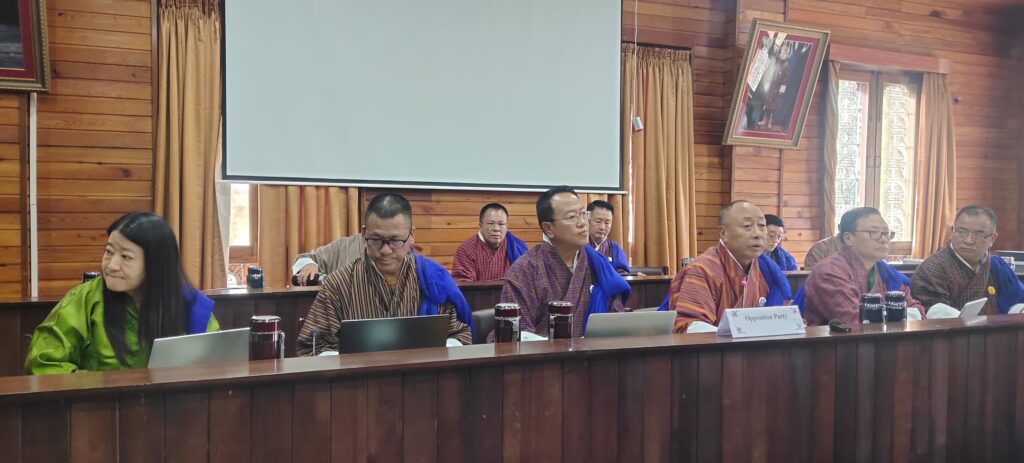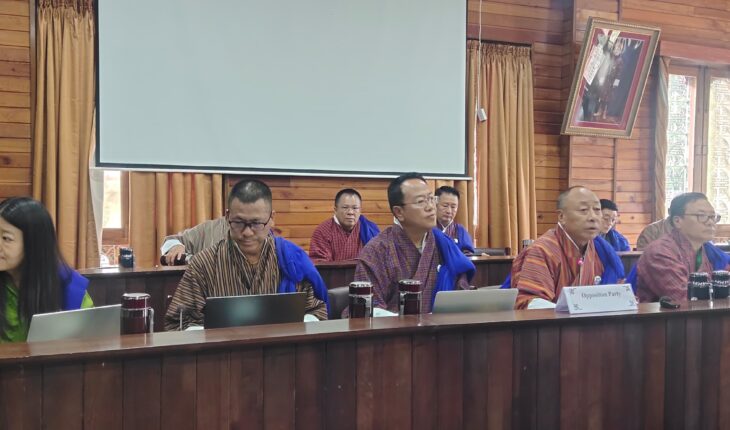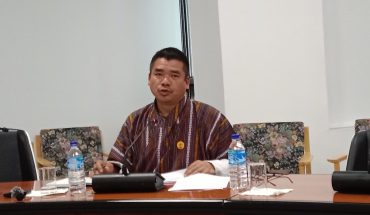
DAWA ZANGMO
Thimphu
The Opposition Party has raised strong concerns over the government’s 2025 State of the Nation report, calling it insufficient as a credible national roadmap.
During a press conference held shortly after the conclusion of the Parliament’s summer session, Opposition members stated that the Prime Minister’s address, though optimistic in tone, lacked essential components such as a realistic implementation strategy, measurable goals, and accountability frameworks.
They emphasized that the report, which was expected to assess the government’s annual performance and outline future plans, instead presented a vision disconnected from the country’s immediate challenges.
The government’s flagship initiative the 10X National Economic Vision drew the most scrutiny.
Launched in June 2025, the 10X Vision aspires to accelerate economic development by scaling investment across key sectors such as energy, agriculture, tourism, the digital economy, manufacturing, services, and mining.
The Prime Minister described it as a transformative roadmap designed to make Bhutan a competitive investment destination by 2050.
However, the Opposition contended that while the vision sounds promising, it lacks the practical detail required to ensure execution. Members pointed out that it provides no short-term or medium-term planning, no financial allocations, and no clear system for monitoring progress.
Bartsham Shongphu MP Rinchen Wangdi, said that the opposition party was particularly critical of the way the 10X Vision is repeatedly cited by the government as the solution to pressing issues, including the ongoing exodus of Bhutanese youth seeking better opportunities abroad.
He warned that a distant and undefined 2050 target cannot be considered a solution unless accompanied by clear, phased strategies.
“Each time we raise concerns about human capital flight and outmigration, the government refers us to the 10X Vision,” he said.
The opposition party also expressed skepticism over the government’s target of securing Nu 500 billion in foreign direct investment (FDI) by 2029.
They said that while it is an ambitious figure, there appears to be no evidence of feasibility studies or detailed investment policies to support such a goal.
Members suggested that targets of this scale require more than just announcements they demand strategic groundwork, investor confidence, regulatory reform, and economic diplomacy.
In its current form, the opposition believes the plan is more aspirational than attainable.
Concerns about the private sector’s role in Bhutan’s economy also featured prominently in the Opposition’s critique.
Despite the government’s acknowledgment of private sector development as a priority, the Opposition noted a distinct absence of targeted measures to enable business growth.
The Opposition party also highlighted that access to finance remains a significant hurdle, especially for small and medium sized enterprises.
They also pointed out that there have been no significant policy reforms to ease the cost of doing business or to attract domestic entrepreneurship.
According to them, the government must do more to create a business-friendly environment if it hopes to see the private sector take a leading role in national economic transformation.
The opposition made it clear that they are not opposed to all government initiatives. They voiced support for the third child incentive policy and the proposed rural life insurance scheme, which they said are both well intentioned and potentially beneficial.
The third child policy aims to encourage population growth amidst demographic decline, while the rural life insurance initiative seeks to improve social safety nets in less developed regions.
However, Opposition Leader Pema Chewang argued that even these programs suffer from poor planning.
“We supported the third child policy and the rural life insurance scheme because they serve the people. But the government failed to back these ideas with proper research and implementation frameworks,” he stated.
Another recurring concern throughout the press conference was the lack of performance tracking for government programs.
The opposition underlined the importance of having well defined monitoring and evaluation mechanisms for major national initiatives like the 10X Vision.
Without performance indicators and clearly defined milestones, they said, it is nearly impossible to determine whether government projects are delivering results or merely generating publicity.
One member said, “Planning without evaluation is like navigating in the dark. We need to see where we’re going and whether we’re getting there.”
The overall structure and content of the State of the Nation report were also criticized for being too superficial and self-congratulatory.
The Opposition said the report lacked critical reflection on past shortcomings and gave little attention to structural problems such as youth unemployment, skills mismatch, inflation, and rural-urban inequalities.
They claimed that the government’s tendency to emphasize optimism over realism reduces the report’s value as a policy document.
According to the party, an honest performance review should include not only achievements but also lessons learned and adjustments needed.
Furthermore, the opposition expressed disappointment in the disjointed nature of the policy priorities presented in the report.
They said that national strategies appeared fragmented across sectors, with little effort to align or integrate them.
Further, they argued that an integrated and coordinated approach is necessary for the effective implementation of development policies.
Fiscal planning was another issue of concern. The opposition flagged the government’s increasing public debt and questioned the sustainability of its financial commitments in light of limited revenue growth.
They said the report did not provide clarity on how the government plans to balance large scale investment plans with prudent fiscal management.
Members also called for greater transparency in budgeting and stronger fiscal discipline to ensure long-term stability.
Opposition party leader said the report offered only a narrow view of upcoming legal reforms and failed to address critical sectors such as education, healthcare, and labor markets.
In their view, a strong legislative roadmap is essential for addressing Bhutan’s evolving social and economic challenges, and the report fell short of laying out such a vision.
Another major concern raised by the opposition was the limited inclusivity in national policymaking.
Members stressed that effective governance requires broad consultation with stakeholders, including local governments, civil society, academia, and the private sector.
They said the government must move away from top-down planning and adopt a participatory approach to ensure that policies reflect the realities on the ground.
“Public policy cannot succeed without public ownership,” said Opposition Leader Pema Chewang.
Throughout the press conference, the opposition party reiterated that their criticism is rooted in a desire to improve governance and policymaking.
They emphasized that their role is to hold the government accountable and ensure that national strategies are not just visionary, but implementable, transparent, and evidence-based.
Additionally, they clarified that their intent is not to obstruct but to support policies that genuinely benefit the people.
However, they believe that support must be earned through clear planning, credible leadership, and meaningful engagement with all sectors of society.
Meanwhile, the government has yet to issue an official response to the Opposition’s statements.
Political observers, however, note that such scrutiny is a healthy part of democratic governance and serves to enhance policy effectiveness through accountability and constructive dialogue.
The Opposition concluded by urging the government to revisit the report with greater clarity and realism and to incorporate feedback into future planning.
The Opposition further insists that the government must demonstrate not just ambition, but action, backed by sound planning and a commitment to inclusive development.





